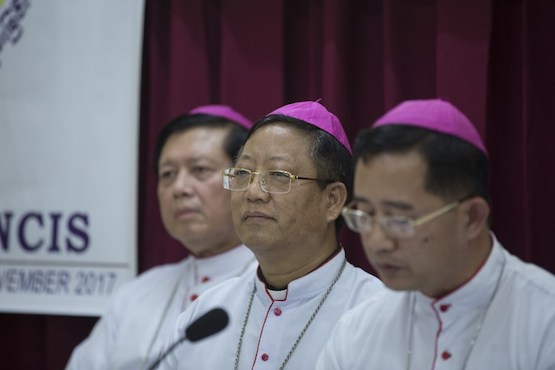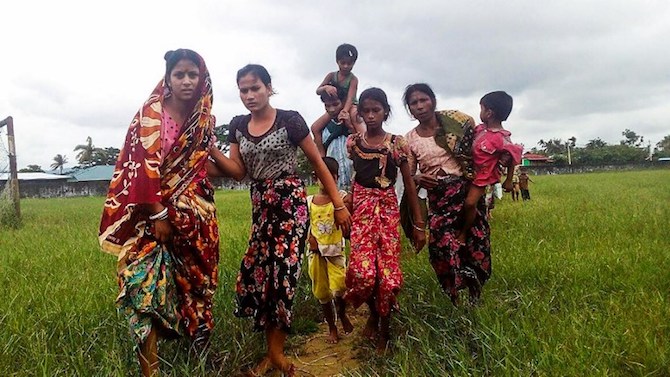Myanmar Bishops Ask Pope Not to Use Rohingya Term during Visit
IN FOCUS, 4 Sep 2017
The visit, aimed broadly at helping the troubled peace process in the strife torn country, welcomed by faith leaders.

Bishop Felix Lian When Thang, president of the Catholic Bishops’ Conference of Myanmar, attends a press conference about Pope Francis’ visit to Myanmar, in Yangon on Aug. 28. Pope Francis will visit Myanmar and Bangladesh later this year, the Vatican announced on Aug. 28, hours after the pope decried the plight of Rohingya Muslims as they flee fresh fighting between the army and militants. (Photo by Aung Kyaw Htet/AFP)
29 Aug 2017 – The Catholic Bishop’s Conference of Myanmar (CBCM) have suggested to Pope Francis not to use the term “Rohingya” when he visits Myanmar for three days in November.
The CBCM put forward their suggestion to the pope’s representative in the country Archbishop Paul Tschang In-Nam, during their bi-annual meeting in June.
“We just gave suggestions that the word Rohingya remains a sensitive issue in the country and it is better not to use it during his visit,” said Archbishop Alexander Pyone Cho of Pyay, whose diocese covers Rakhine State.
The bishops made their suggestion after they became aware of the pope’s plan to switch the first leg of his trip from India to Myanmar.
Leaked news of the pope’s visit earlier created unrest on social media in the country, which has suffered simmering tensions between Buddhists and Rohingya in Rakhine State since 2012.
In this time, the use of the term Rohingya, the name the group self-identify with, has become a sensitive issue. The government and military — along with many Myanmar citizens — instead refer to the Rohingya, who number up to 1.1 million, as “Bengalis” claiming they hail from, neighboring Bangladesh.
Some Catholic netizens voiced their concerns online. “We pray that pope will not use Rohingya,” “It is better not to use Rohingya and raise Rakhine issue,” and “Church leaders should suggest pope not to use Rohingya,” were some online comments made by Myanmar Catholics.

Women and children fleeing violence in their village arrive at Yathae Taung township in Rakhine State in Myanmar on Aug. 26. Terrified civilians tried to flee remote villages in Myanmar’s northern Rakhine State for Bangladesh on that day to avoid clashes between suspected Rohingya militants and Myanmar security forces. (Photo by Wai Moe/AFP)
Those with few concerns
However, several faith leaders speaking with ucanews.com hold different views.
Wunna Shwe, joint secretary general of the Myanmar’s Islamic Religious Affairs Council, said he welcomed the news of the pope’s visit.
“As a religious leader, Pope Francis can use Rohingya in his prayers in Myanmar as this is not an attempt to interfere with another country’s politics,” Wunna Shwe told ucanews.com.
He said that the pope’s visit would accelerate harmony and dialogue among the country’s different faiths.
Ashin Thuriya, a Yangon-based monk involved in interfaith activities, said he is very glad that Pope Francis will visit Myanmar and agrees it will bring harmony to the country.
“I have no concerns on whether the pope will talk about the Rakhine issue as I understand that the Catholic leader already understands the reality of Myanmar,” Ashin Thuriya told ucanews.com.
Bishop Pyone Cho said the pope’s Nov. 27-30 visit is for all of Myanmar’s people and is aimed at helping bring peace to the country. The visit is not about the Rakhine issue unlike how the international media try to link it to, he said.
Kyaw Min, chairman of a Yangon-based Rohingya party — the Democracy and Human Rights Party — said the pope should decide himself whether to use the term Rohingya. “I appeal to Pope Francis to discuss the plight of Rohingya when he meets with government’s leaders,” Kyaw Min told ucanews.com.
Kyaw Min said he condemned the recent violence committed by Rohingya militants in Rakhine State. “Violence will not bring solve the problem,” he said.
Attacks on dozens of police and border posts in northern Rakhine by the Arakan Rohingya Salvation Army on Aug. 25 marks a dramatic escalation of the conflict that has simmered since October 2016 after similar attacks led to a military crackdown that forced thousands of Muslim Rohingyas to flee or attempt to enter Bangladesh.
The death toll from the recent violence has risen to 104, mostly Rohingya militants plus 12 security forces and several civilians, according to government statements. Myanmar’s security forces continue so-called clearance operations in the north of Rakhine State.
‘Humility and advocacy’
Bishop Felix Lian Khen Thang, president of CBCM, said the pope is known for his humility and advocacy for those marginalized and poor.
“As the Catholic Church is committed to take part in nation building, his presence in Myanmar will further enable the role of the church in the country especially in education, healthcare, environment and women and children,” Bishop Felix Lian Khen Thang of Kalay told ucanews.com.
The bishop added that the visit will help the country’s development during its transition to democracy.
During his visit, Pope Francis will meet youth, civil society, religious leaders and government leaders.
After Myanmar, the pope will visit neighboring Bangladesh from Nov. 30 to Dec. 2.
___________________________________________
Related Reports:
- Pope Francis to make surprise visit to Myanmar on peace mission
- Vatican officials visit Myanmar, Bangladesh ahead of pope’s trip
- Pope throws support behind Muslim Rohingya
DISCLAIMER: The statements, views and opinions expressed in pieces republished here are solely those of the authors and do not necessarily represent those of TMS. In accordance with title 17 U.S.C. section 107, this material is distributed without profit to those who have expressed a prior interest in receiving the included information for research and educational purposes. TMS has no affiliation whatsoever with the originator of this article nor is TMS endorsed or sponsored by the originator. “GO TO ORIGINAL” links are provided as a convenience to our readers and allow for verification of authenticity. However, as originating pages are often updated by their originating host sites, the versions posted may not match the versions our readers view when clicking the “GO TO ORIGINAL” links. This site contains copyrighted material the use of which has not always been specifically authorized by the copyright owner. We are making such material available in our efforts to advance understanding of environmental, political, human rights, economic, democracy, scientific, and social justice issues, etc. We believe this constitutes a ‘fair use’ of any such copyrighted material as provided for in section 107 of the US Copyright Law. In accordance with Title 17 U.S.C. Section 107, the material on this site is distributed without profit to those who have expressed a prior interest in receiving the included information for research and educational purposes. For more information go to: http://www.law.cornell.edu/uscode/17/107.shtml. If you wish to use copyrighted material from this site for purposes of your own that go beyond ‘fair use’, you must obtain permission from the copyright owner.